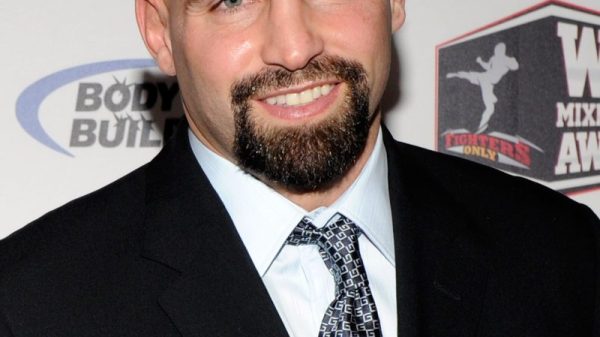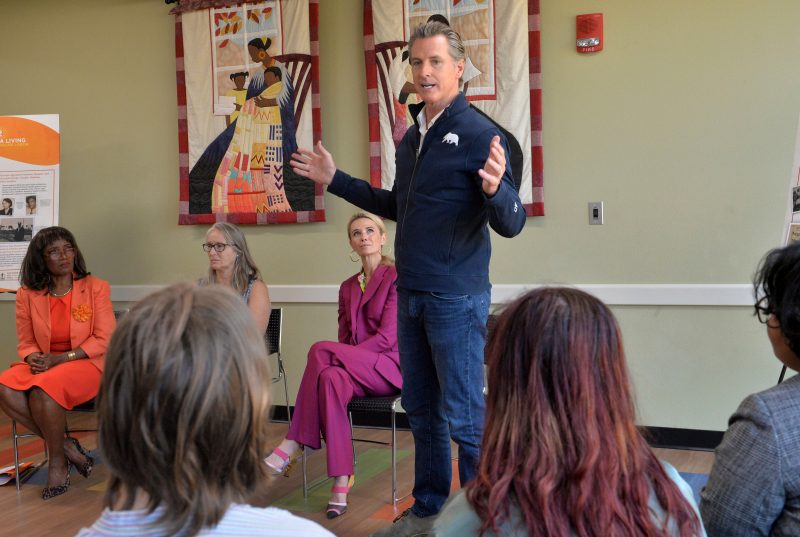Appearing in Florida as part of his red-state tour to fight “rising authoritarianism,” California Gov. Gavin Newsom (D) met with students and faculty members from the New College of Florida, the liberal arts institution embroiled in Gov. Ron DeSantis’s (R) higher education overhaul and the country’s culture wars.
In a post about the meeting on Twitter, Newsom pointed to an “all out assault on public education” in conservative states: “Books banned. Teachers silenced. Students intimidated.”
“DeSantis’ war on New College has done nothing but hurt its students and threatened their education,” he wrote.
DeSantis’s team did not immediately respond to a request for comment Wednesday night.
The tension between the governors comes amid DeSantis’s efforts to impose conservative oversight on Florida’s schools and universities and increasing pushback from Newsom, who launched a national organization last week to fight restrictive abortion laws, loosened gun regulations, curriculum restrictions and other initiatives by conservative leaders.
The New College of Florida, a small, public institution that describes itself as a community of “freethinkers,” has recently been targeted by the Florida governor, who has said he would like to transform it into something like Hillsdale College, a private, conservative Christian school in Michigan. To that end, DeSantis has installed conservative board members who have voted to dismantle New College’s diversity office and replaced the school’s president with a Republican politician.
The changes coincide with broader efforts by DeSantis to reimagine education in Florida by banning gender studies majors and prohibiting affirmative action programs, among other proposed changes. As DeSantis lays the foundation for a likely presidential bid, some educators have expressed concern that the changes in Florida could be a preview of what’s to come nationally.
At New College, once seen as an LGBTQ haven, the shift has sparked protests. One student, environmental studies major Willem Aspinall, told the Associated Press that the institution felt like a “little bubble” in Florida. “Now it feels like that has kind of been burst. The campus feels a lot less safe now,” he said.
Newsom’s Sarasota visit is one stop on his trip around the South, part of his “Campaign for Democracy,” which seeks to “confront and defeat unAmerican authoritarianism,” according to the organization’s website.
Newsom took aim at DeSantis directly in remarks at North Sarasota Public Library, near New College, on Wednesday, accusing him of “bullying and intimidating vulnerable communities.” He told students, “You’re not only on the right side of history, you have something he’ll never have — moral authority,” Sarasota’s Herald-Tribune reported.
In a statement to the Herald-Tribune, DeSantis spokesman Bryan Griffin said the governor is “focused on getting Florida’s public institutions of higher learning refocused on academics and truth” and that “stunts from political opponents” have “no effect.”
The two governors have had public spats in the past. Last summer, Newsom ran a political ad in Florida in which he criticized DeSantis’s policies and urged “all of you living in Florida to join the fight or join us in California, where we still believe in freedom.” During a speech in California last month, DeSantis snapped back at the governor, saying, “You guys got a lot of problems out here, but your governor is very concerned about what we’re doing in Florida” and that California is “hemorrhaging population.”
Both men are believed to have presidential ambitions, though Newsom has said he supports President Biden and does not plan to run in 2024. Education is expected to be a hot-button issue on the campaign trail.
“Higher education has long been a key battleground during moments of heightened political divide,” Eddie R. Cole, a professor of higher education and history at UCLA, wrote in an email. He called DeSantis’s moves at New College “political interference” that “should concern everyone in America.”
“Regardless of political leaning,” he said, “everyone should want their state’s campuses to remain accredited, maintain academic freedom, and give students and faculty the leeway to teach and learn.”



























